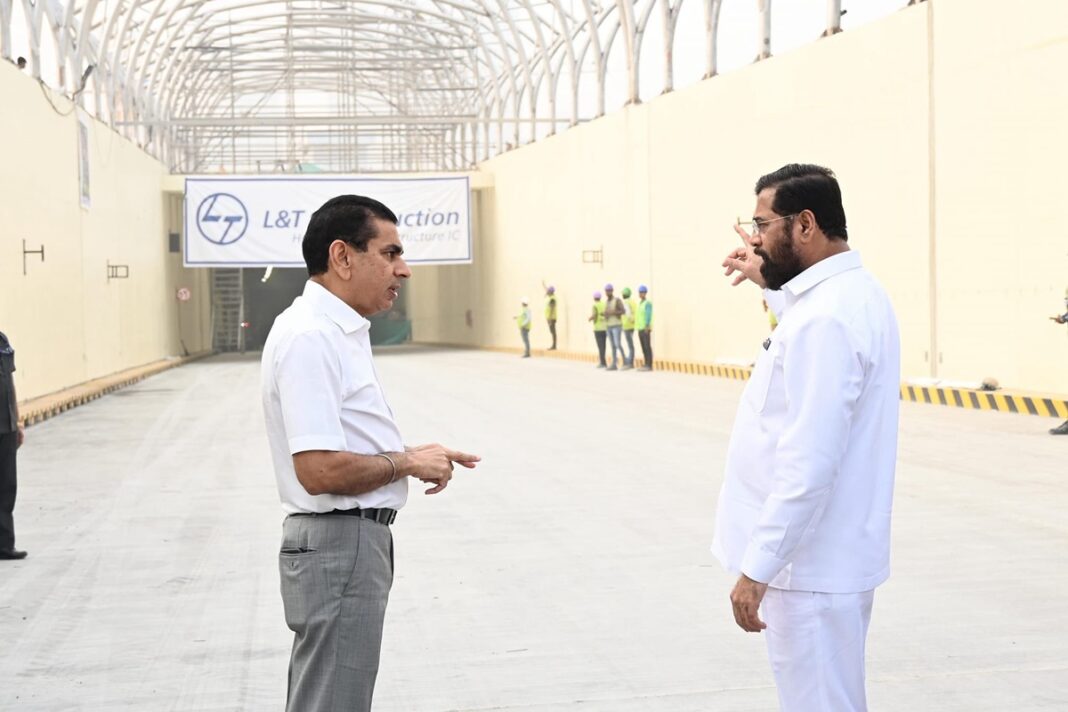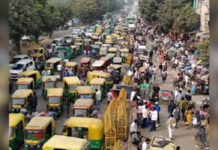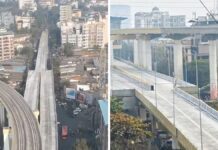X: @the_news_21
In a stride towards transforming Mumbai’s landscape and easing the city’s perpetual traffic snarls, Chief Minister Eknath Shinde recently revealed the impending partial opening of the Mumbai Coastal Road Project’s toll-free first phase by month-end. This announcement brings a glimmer of hope to Mumbai’s commuters amid the city’s perennial traffic woes.
During a cleanliness campaign launch at the twin-tunnel of the Mumbai Coastal Road (MCR) near Priyadarshini Park on Napean Sea Road, CM Shinde disclosed that the completion of the 2.07 kilometers long tunnel, stretching from Worli to Girgaon Chowpatty on Marine Drive, marks a pivotal milestone. Set to open its south-bound arm by January’s end, this phase heralds the project’s initial foray into enhancing Mumbai’s transit infrastructure.
A notable feature of this tunnel system is the incorporation of Saccardo nozzles—a cutting-edge ventilation system. These nozzles will introduce directed air-jets to optimize ventilation, revolutionizing air quality within the tunnels. Additionally, the infrastructure boasts emergency utility boxes every 300 meters and an advanced traffic management control center to ensure seamless operations and safety.
CM Shinde lauded the project’s innovation and emphasized the significant time and fuel savings it would bring, alongside reducing emissions—a pivotal step towards sustainability in urban transport.
The MCR, a pet project envisioned by former CM Uddhav Thackeray, stands as a beacon of modern infrastructure in Mumbai. Constructed by the Brihanmumbai Municipal Corporation (BMC) at a cost exceeding Rs 12,000 crore, it reclaims 111 hectares from the Arabian Sea, earmarking space for interchanges, a protective sea-wall, public areas, and various amenities.
The project’s comprehensive scope extends beyond connectivity, encompassing a 8.50 kilometers long and 20 meters wide sea-promenade, housing attractions like a biodiversity park, lush gardens, cycle tracks, open-air theaters, seating areas, and underground parking for over 1,800 vehicles.
Moreover, this ambitious endeavor acts as a linchpin for the proposed 44-kilometer Coastal Road extension from Versova to Virar (Palghar), further integrated into the Rs 1 lakh crore Delhi-Mumbai Expressway, currently in advanced stages of construction.
Preceding the Coastal Road’s phase unveiling, Prime Minister Narendra Modi is set to inaugurate the ‘Atal Behari Vajpayee Sewri-Nhava Sheva Atal Setu’—the Mumbai Trans Harbour Link (MTHL)—shortening Mumbai-Raigad travel time to a mere 20 minutes, an enormous leap from the current two-hour journey.
The MTHL stands poised to catalyze futuristic connectivity, linking major infrastructural nodes like the Mumbai-Pune Expressway, Mumbai-Goa Highway, Virar-Raigad corridor, Mumbai Port Authority, Navi Mumbai International Airport, and emerging as a gateway to the coastal Konkan region.
As Mumbai gears up for these transformative projects, the city’s infrastructural makeover heralds a new era of connectivity and accessibility, promising a future of seamless transit and regional connectivity.
Also Read: Maharashtra’s Political Chessboard: Seat-Sharing Tussle and the VBA’s Dilemma







can i purchase cheap clomiphene without a prescription can i order clomiphene online clomid prescription cost clomid generic name buy cheap clomid without dr prescription clomiphene chance of twins cost of clomid price
Ramatogel adalah tempat membawa keberuntungan terbesar di Indonesia dan menyediakan persentase tertinggi mari gabung sekarang di ramatogel dapatkan bonus fantastis setiap hari
I couldn’t weather commenting. Well written!
This is the kind of advise I find helpful.
zithromax cheap – buy ciprofloxacin 500mg online cheap order flagyl without prescription
order rybelsus for sale – buy periactin without prescription generic periactin 4mg
buy domperidone generic – order motilium for sale flexeril usa
buy generic propranolol online – order methotrexate 10mg pill methotrexate 10mg drug
cheap amoxicillin sale – oral diovan 80mg buy ipratropium cheap
zithromax oral – buy generic azithromycin 250mg nebivolol 5mg usa
augmentin 625mg pills – https://atbioinfo.com/ buy generic ampicillin
esomeprazole over the counter – https://anexamate.com/ buy esomeprazole 40mg without prescription
brand medex – anticoagulant cozaar 25mg over the counter
meloxicam price – relieve pain meloxicam oral
purchase prednisone generic – aprep lson oral deltasone 10mg
the best ed pill – https://fastedtotake.com/ otc ed pills
purchase amoxil pills – purchase amoxicillin pill buy amoxicillin pills for sale
diflucan 200mg sale – buy forcan online cheap diflucan ca
order generic cenforce 50mg – https://cenforcers.com/# purchase cenforce
cialis online overnight shipping – click cialis free trial voucher 2018
cheap t jet 60 cialis online – https://strongtadafl.com/ what possible side effect should a patient taking tadalafil report to a physician quizlet
zantac 150mg pill – ranitidine 150mg over the counter zantac 150mg price
viagra cheap fast delivery – https://strongvpls.com/ viagra for sale birmingham
The thoroughness in this break down is noteworthy. https://gnolvade.com/es/provigil-espana-comprar/
I am in fact thrilled to glitter at this blog posts which consists of tons of worthwhile facts, thanks object of providing such data. https://ursxdol.com/propecia-tablets-online/
More posts like this would make the blogosphere more useful. https://prohnrg.com/product/loratadine-10-mg-tablets/
This website exceedingly has all of the information and facts I needed about this participant and didn’t identify who to ask. https://ondactone.com/spironolactone/
Thanks on putting this up. It’s okay done.
https://proisotrepl.com/product/colchicine/
With thanks. Loads of erudition! http://iawbs.com/home.php?mod=space&uid=914824
forxiga 10mg cheap – https://janozin.com/ buy dapagliflozin 10 mg for sale
buy xenical – order xenical pills xenical pills
Proof blog you be undergoing here.. It’s intricate to assign elevated worth article like yours these days. I really respect individuals like you! Rent vigilance!! http://www.dbgjjs.com/home.php?mod=space&uid=532990
You can keep yourself and your stock by way of being cautious when buying panacea online. Some pharmacopoeia websites control legally and put forward convenience, solitariness, bring in savings and safeguards as a replacement for purchasing medicines. buy in TerbinaPharmacy https://terbinafines.com/product/tadapox.html tadapox
More posts like this would prosper the blogosphere more useful.
Với giao diện mượt mà và ưu đãi hấp dẫn, MM88 là lựa chọn lý tưởng cho các tín đồ giải trí trực tuyến.
iwin – nền tảng game bài đổi thưởng uy tín, nơi bạn có thể thử vận may và tận hưởng nhiều tựa game hấp
Berlin ist auch für Glücksspielliebhaber immer eine Reise wert. Im Automatenspiel erfüllt ihr indes mit gepflegter Freizeitkleidung, die aber nicht zu leger gewählt werden sollte, die Kleidervorgaben. Wer es nicht ganz so fürstlich und weniger kostspielig speisen will, ist im Restaurant Syght gut aufgehoben. Das ist vornehmlich den vielen und regelmäßig stattfindenden Turnieren geschuldet, da auf diese Weise den Spielern und Zuschauern ein angenehmeres Umfeld geschaffen wird. Ganz in der Nähe der Ruhrmetropole Dortmund und nur einen Steinwurf von der Burg Hohensyburg entfernt zieht die zur Westspiel-Gruppe gehörenden Spielbank seit 1985 Casino-Fans in seinen Bann.
Im Holland Casino Venlo finden Sie eine breite Auswahl an Spielen, darunter klassische Tischspiele wie Roulette, Blackjack und Poker. Es befindet sich in der niederländischen Stadt Venlo, nahe der deutschen Grenze, und bietet eine Vielzahl von Spielmöglichkeiten für Glücksspielfans. Regelmäßig finden Texas Hold’em Turniere, Bingo-Abende und thematische Event-Nächte statt, die für zusätzliche Unterhaltung sorgen.
Denn im Haus finden auch immer wieder Verlosungen oder verschiedenste Themenabende statt. Einen besonderen Nervenkitzel garantieren gleich drei Jackpots, außerdem gibt es abgesehen von den klassischen einarmigen Banditen auch noch Multi-Keno-, Hyperlink und Multiroulette-Automaten. Das Auto kann eventuell im Staatstheater-Parkhaus oder in der Parkgarage Kurhaus/Casino, welches einen direkten Zugang zur Spielbank hat, kostenpflichtig abgestellt werden.
References:
https://online-spielhallen.de/novoline-casino-freispiele-ihr-umfassender-leitfaden/
This place is also rich with well-known game developers, so it’s actually convenient for both casual and high-stakes players. With a diverse range of games (over 8,000 titles), including classic slots and live dealer games, there’s something for everyone. Popular options include free spins promo codes and deposit bonus codes. Check for active no deposit bonus codes on the promotions page or via email. To log in, go to the official website at staycasino.bet, click on “Login,” and type in your email and password. It includes over 8,000 games, including slots, table games, and live dealer games, so there is something for everyone.
We feature an extensive range of Australian online slots from over 70 game providers. While wagering terms and limited support hours may be slight drawbacks, the positives far outweigh the negatives. The platform operates under a reputable international license and employs SSL encryption to protect user data. The low minimum deposits and quick crypto withdrawals make Stay Online Casino stand out compared to many competitors. The casino consistently ranks among reliable AU operators and is known for fast verification and withdrawals.
We offer a choice from more than 400 Saudi Arabia hotels and apartments throughout the whole Saudi Arabia. Saudi Arabia hotel reservation company. We would like to stay longer on our next trip to mecca. Al Majlis Restaurant, where you can eat, is walking distance to the hotel…
References:
https://blackcoin.co/bridge-poker-rules/
In order to claim a bonus in the welcome package, you must deposit a minimum of $20. Every weekend you can boost your deposit with a 50% match deposit bonus. You can claim as much as $5,000 in match bonuses and 300 free spins.
Spinight Casino is a pokies-heavy online casino with fast crypto withdrawals, big bonuses, and a growing reputation among Australian and New Zealand players. In this Pistolo Casino review, I walk through bonuses, banking, gameplay, support, mobile features, and overall usability to help you decide whether it fits your needs. This wide range of currencies lets players enjoy their preferred games and conduct transactions in the money that fits them best, therefore offering a handy and inclusive gaming experience for all. Apart from having plenty of online slots for players to enjoy, the casino has a broad selection of classic table games. In conclusion, Richard Casino offers a comprehensive online gambling experience with its vast game selection, generous bonuses, and player-friendly features. Professional dealers host these games in real-time, providing an immersive and interactive experience for players who crave the authentic casino atmosphere.
References:
https://blackcoin.co/lucky-hunter-casino-a-comprehensive-review/
paypal casinos online that accept
References:
https://lovelocals.us/ashleebenge221
us online casinos that accept paypal
References:
https://kokitasi.online/bbs/board.php?bo_table=free&wr_id=203